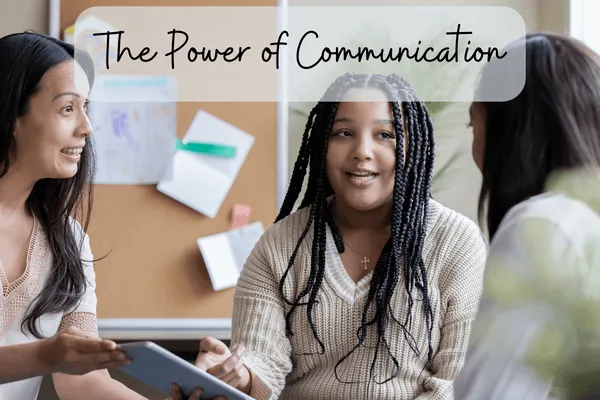

Bridge the Gap
"Let us remember: One book, one pen, one child and one teacher can change the world." -- Malala Yousafzai

A mom walks down the empty hall and turns into her sons Kindergarten classroom. He’s sitting there quietly at his desk while the teacher is busy cleaning the chalk board:
Mrs. Miller: “Hi, Mrs. Jones, you asked me to come by?”.
Mrs. Jones: “Hi, Mrs. Miller. Yes, I did. Today we had a bit of an issue with Ben. He seemed to get really frustrated and he tried throwing a chair at me. Luckily, no one was hit.”
Mrs. Miller takes a moment to look at her son and turns back to Mrs. Jones, “He did?”
The teacher responded, “Yes, he didn’t like that it was time to pick up and start on the next lesson. I tried to explain to him that play time was over and it was time to sit back down in his seat, which he then tried to pick up and throw at me. Thankfully, none of the other students were in between us and the chair didn’t go far. We don’t allow that type of behavior in the classroom.”
To which the mom responded with, “Is there anything else he did that I should know about?”
You see, that mom was me and I knew what my son had a temper…
As I spoke that question, I visually saw her shoulders relax. It took me a moment, but I realized that she had been prepared for me to argue back, fight, defend my son, or say something like, ”My son would never…”, arguments I had heard many times walking into the classrooms of one of my children.

We spoke for a few more minutes, the three of us, ending with Ben apologizing for his actions. One of the lessons I walked away with that day was the realization of how often teachers had to defend themselves to parents because of a child’s behavior. And that was 25 years ago!
Even though I am now in the homeschool realm and no longer have a parent/child/teacher relationship to negotiate, I have family members and friends who are teachers. The stories I have heard over the past years leads me to believe that things haven’t changed. As a parent, I felt one of the most important relationships during the formative years was the relationship between my children's teachers and myself. After all, they spent most of the day with my kids.
I recently asked the teachers I know to share some of the things they wish parents were aware of. Here is what they shared:
Communication: The communication between parent and teacher is like a bridge, connecting what the child does at school to the responsibilities they have after school, such as homework and having papers signed. When parents and teachers work together, they create an environment where a student feels a sense of stability and support all around.

Ask First: There are at least two sides to every story: if you ask 5 students what happened in class today, you’ll more than likely get 5 different answers. When your student comes home upset, don’t automatically jump to conclusions. Something the majority of my teacher friends express was, “I wish the parent would come talk with me. Most of the time it’s a simple misunderstanding.” (99% of the time there is no need to sound alarm bells. Give your childs teacher a chance to provide clarification and additional context before considering any drastic actions that might impact their career.)
Advocate for your student: Parent/Teacher Conferences and Open Houses are important. Every attempt should be made to attend. Your student’s teacher takes time away from their family for these Special Events, typically without pay. These are specific times set aside to: meet your child’s teacher, learn how your student is doing in school, or a chance for both you and the teacher to sit down and have some uninterrupted time to discuss how your student is doing. You may just find out that your child is struggling and have a chance to help them – before it’s too late. One educator said it best, “Life is too short to be a drive-by parent – be as involved as you can be.”
Don’t shoot the messenger: Nobody wants to hear criticism about their child. As parents, we want to think our child is a rockstar and, while it is natural for us to be defensive of a family member, keep in mind sometimes, they’re not. Remember, the child a teacher interacts with at school may be totally different than the child a parent experiences at home. I can remember hearing, “She’s such a joy to have in class” and scratching my head, because that was NOT the child I had at home. This is an opportunity to take a deep breath and listen to what the teacher is saying. It may alert you to an issue or maybe answer an nagging question…is my child struggling to read…or just doesn’t care. The teacher is only trying to help support your student the best they can.

Your attitude matters: How you talk about your child’s teacher at home translates to how your child treats them at school. Don’t badmouth or speak negatively about them in front of your child. If you have an issue or concern, take it to the teacher.
Teachers are human too: Remember, teachers have a life outside of school. Technology has made it easy to reach out any time, day or night. Teachers have spent all day with their students and then go home to care for their own families. Be mindful of that. Unless there is an urgent issue, try to keep the texting and calling to a minimum. And don’t expect them to jump each time their phone buzzes with a notification. When they have a moment, they will check their messages….if it’s not too late in the evening.
Technology: This may be one of the biggest and hardest obstacles teachers face in today’s technology age. Almost every student is connected to technology somehow. Most schools have their own rules regarding phones and such in the classroom. Make sure to check with each teacher your child has to see what their rules are. For most, if your child is texting or posting on social media while they should be in class, there will be consequences. Teach your child that the phone is a privilege, not a right. If the teacher/school has a rule against them, the student needs to follow it.
Technology at home: Set a technology curfew at home…for everyone. Allowing a child to go to bed with a cell phone allows for that mindless scrolling that we’ve all done. If we can’t moderate the mindless scroll ourselves as adults, why should we expect our children to know how to do so? When possible, create a charging station in the kitchen, or a common area, with the expectation that cell phones will be placed there by a certain time each evening. Everyone will get a good nights sleep.
Reading: Reading is pivotal for all age levels. Reading requires constant practice and repetition in order to master. This cannot be the sole responsibility of the teacher or school system. For younger kids, make it part of a nightly routine to read a book before bed. Even older students like to be read to sometimes. Reading is foundational – that is the one skill every person needs throughout life.
My Rules: You have rules that you expect to be followed at home. Teachers respect that and they hope that you show the same respect in the classroom. Their classroom: their rules.

As parents and educators, our common goal is clear: setting the stage for our children's growth and success.
That encounter in my son's kindergarten classroom had a profound effect on how I interacted with teachers from then on.
I think that was truly the first time I actually saw the person rather than “the teacher”.
I embarrassed to admit – my son is my youngest. By the time he entered Kindergarten, I had students in 6th, 4th, and 2nd grade as well. It makes me sad to think of all the missed opportunities I had had to support these teachers who gave so much of themselves.

As this new school year starts, let’s take a moment and see our teachers for who they are. Humans, people who make mistakes, have good and bad days, have a life and family outside school walls, and have feelings too. Let’s show our children how we, as parents and teachers, can work together to give them the support and guidance they need to have an amazing year and develop a love of learning.

